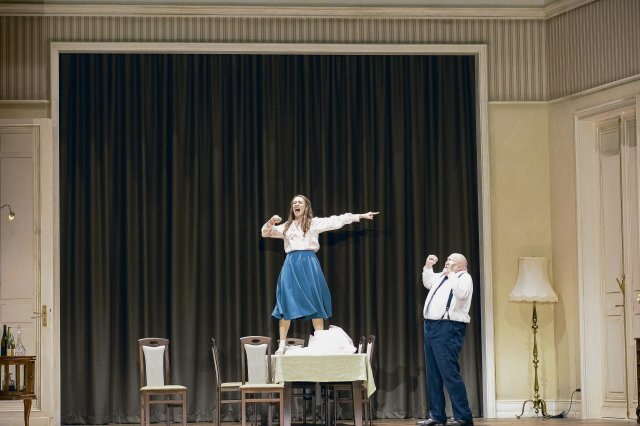Hallo Furie, I love you: Brenda Rae als Aminta und Peter Rose als Sir Morosus
Photo: Bernd Uhlig
Among the operas by Richard Strauss are “Salome”, “Elektra” and “The Rosenkavalier” the repertoire sections. Sometimes you encounter the “woman without shadow” and “Arabella”. The ten others are rarities on stage. It can be worthwhile to try them out again; In the supposedly trivial spouse »Intermezzo«, for example, Tobias Kratzer’s direction showed surprising tensions last year.
Shortly after Strauss started to compose “the silent woman”, the government was handed over to the Nazis. The books of the librettist Stefan Zweig were burned as those of a Jew – Strauss, on the other hand, said that as President of the Reich Music Chamber, they could do good for German art. After all, when the Dresden premiere was due in 1935, he prevailed that Zweig’s name was also called. After a few ideas, the opera was discontinued and only staged abroad until 1945.
But even later she didn’t come on stage often. The story of this “comic opera”, for which Zweig returned to a play by the Shakespeare time companion Ben Jonson, offers quite effective scenes. Sir Morosus, admiral in retirement, lives isolated and suffers from any noise. His nephew Henry has teamed up with a theater group against all the civil rules and married the actress Aminta. Morosus disinhered him.
nd.kompact – our daily newsletter

Our daily newsletter nd. compact Bring order to the news madness. You get an overview of the most exciting stories from the Editorial team. Get the free subscription here.
As a rescue from loneliness, he only remains a marriage. His barber gets married candidates, but is secretly with the theater people in the federal government. He arranges everything in such a way that Morosus choses the apparently good-talking-and above all silence-Timidia, but which is none other than Aminta. As soon as Morosus is married, Timidia changes to the fury that tracts the old man uninhibitedly – and above all: noise. Henry is now the only rescue from the supposed wife.
Zweig’s libretto is full of linguistic subtleties, and Strauss presents one of his most complicated scores. Various rhythms overlap in the overture, the harmony is difficult to grasp. In short: the two have presented such a degree of art effort that the immediate effectiveness suffers. They also do without malicious laughter. As much as Morosus is looking for a humble female as a patriarch: his loneliness becomes as clear as the affection that he develops towards Timidia. Accordingly, the actress initially hesitates to tract her victim according to the plus.
These are perhaps the most urgent moments of the work. This is increased by the fact that she has to strangle to her real husband Henry and for a moment the question arises whether the two become really alien; The comedy threatens to tilt seriously. The end is of course comedy harmonious: the theater playing against Morosus leads him to insight. You can ask yourself whether it is all of this about escapism or the preservation of humanity in bad times.
Director Jan Philipp Gloger moves the action to today, to an old Berlin apartment. In the end, he indicates how housing shortages can be solved: the theater group moves in at Morosus, because the apartment is too large for an individual. Projections provide information about the problem of age loneliness, which is socially important. You can only ask whether it is Morosus’ problem, whose noise phobia is only explained by a war experience and indicates inhibition that finally helps to overcome the game in the game.
Beyond the superfluous updates, Gloger leaves the main characters a lot of space. Peter Rose can convey the touching of the old Grantler, Siyabonga Maqungo convinced as his nephew. Brenda Rae as Aminta/Timidia in the first act causes fears in the first act, but in the further sale of the tyrannical wife as convincing as the compassion that she develops towards Morosus. Samuel Hasselhorn gives the barber who stages the game, the appropriate sovereignty without malice. However, the group scenes fail on the too narrowly created stage design and often do not get beyond crowds and bustle.
Above all, the evening belongs to the orchestra. The score is ideal for Christian Thielemann as a conductor and with a preference for the finely graded, culinary sound. Accordingly, his numerous fans celebrated him in the audience of the State Opera at his first premiere as general music director (they will have to be patient again, no further is planned for the season 2025/26).
In fact, Thielemann held the state chapel so far that the singers were facilitated by their very extensive games, and still drew attention to the multi -layered of orchestral events. That was a decisive plea for “the silent woman” – of course one that convinced more from a musical aspect than under the stage effectiveness.
sbobet sbobet88 link sbobet sbobet
